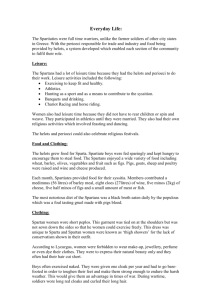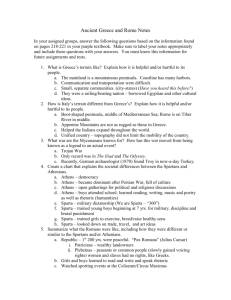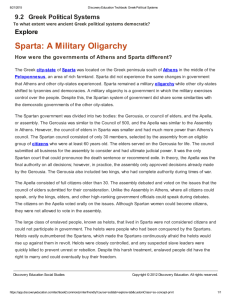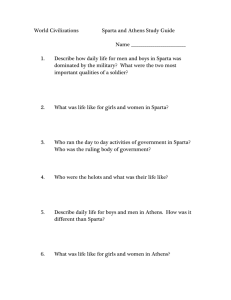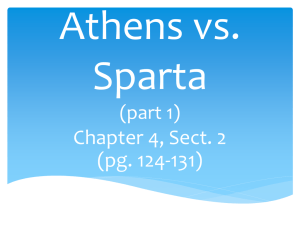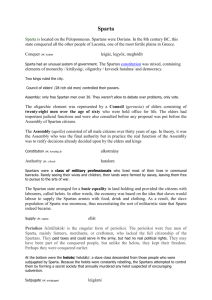University of St Andrews School of Classics
advertisement
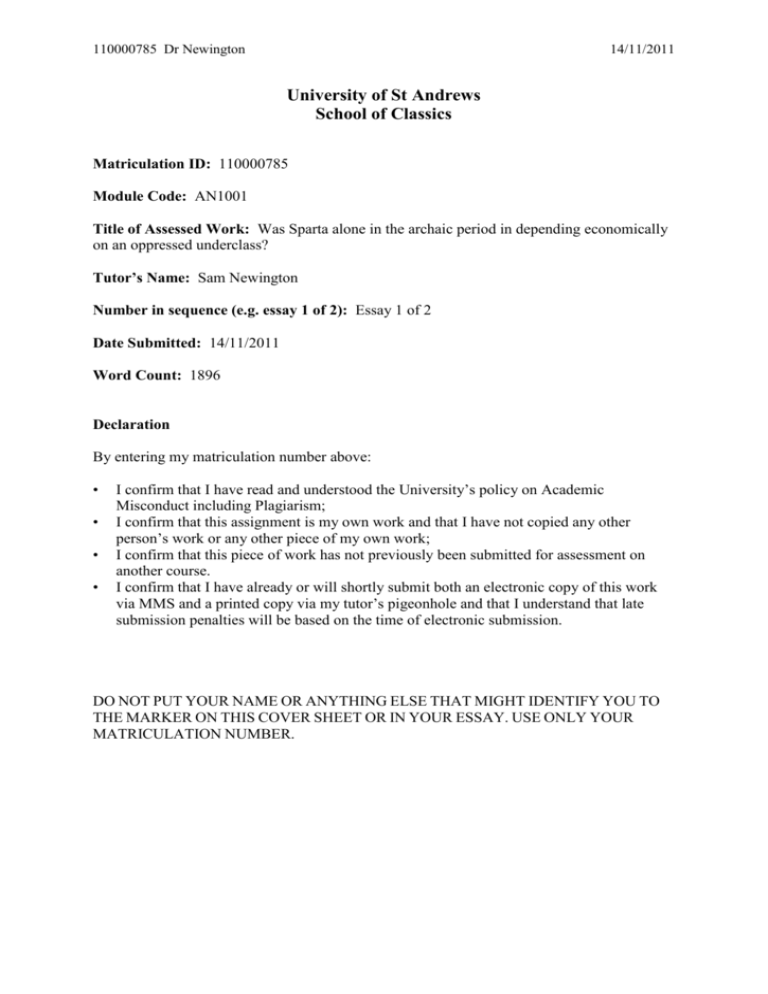
110000785 Dr Newington 14/11/2011 University of St Andrews School of Classics Matriculation ID: 110000785 Module Code: AN1001 Title of Assessed Work: Was Sparta alone in the archaic period in depending economically on an oppressed underclass? Tutor’s Name: Sam Newington Number in sequence (e.g. essay 1 of 2): Essay 1 of 2 Date Submitted: 14/11/2011 Word Count: 1896 Declaration By entering my matriculation number above: • • • • I confirm that I have read and understood the University’s policy on Academic Misconduct including Plagiarism; I confirm that this assignment is my own work and that I have not copied any other person’s work or any other piece of my own work; I confirm that this piece of work has not previously been submitted for assessment on another course. I confirm that I have already or will shortly submit both an electronic copy of this work via MMS and a printed copy via my tutor’s pigeonhole and that I understand that late submission penalties will be based on the time of electronic submission. DO NOT PUT YOUR NAME OR ANYTHING ELSE THAT MIGHT IDENTIFY YOU TO THE MARKER ON THIS COVER SHEET OR IN YOUR ESSAY. USE ONLY YOUR MATRICULATION NUMBER. 110000785 Dr Newington 14/11/2011 Was Sparta alone in the archaic period in depending economically on an oppressed underclass? The helots of Sparta were the most famed of the subordinated dependent populations of the Archaic Greek world, but by no means unique in their underclass status and economic obligations to the polis. The penestai were locked in a similar arrangement with their masters the Thessalians, and there is evidence, though scant, to suggest this system of systematic economic exploitation was much more widespread. In Sicyon the equivalent class was the korynephori (“club-bearers”) or katonakophori (“sheepskin-cloak-wearers”). In Argos, there were the gymnesii (“lightly armed” or “naked ones”), in Syracuse, the killyrioi (“donkeymen”) and in Epidaurus, the konipodes (“dusty-footed”). More obscure are the mariandynoi of Heraclea Pontica and the mnoitae, klarotae and apha miotae1 of Crete. Hall also refers to the existence of dependent communities at Byzantium and West Locris 2; and these are hardly mentioned at all in the history books. Moreover, apart from serfdom, chattel slavery was even more common in Archaic Greece – it is estimated the majority of Athenian citizens owned at least one. The distinction is that the latter were tied to whoever owned them, whereas these aforementioned groups were tied to the land and owned by the state. How was it that these groups of people came to be oppressed and exploited? As with the Greco-Persian wars, the conflict between the Messenians and Spartans was said to have arose – according to the latter anyway – from the seemingly unprovoked violation of native maidens. However, this was confined to one incident in particular, rather than four3. It should be noted here that modern scholars believe that this was a cover for the truth or at the very least, only a secondary cause; and that the main driver for Sparta's decision to go to war was in fact related to its “territorial ambitions”4, of which economics can have played no small part. But nonetheless, according to at least one antiquated version of events5, the blame for the conflict lay at the feet of the Messenians, who committed acts of unspeakable obscenity on sacred grounds, of all places. Spartan virgins were raped and citizens who attempted to intervene killed, among them the Agiad king Teleklos, in the sanctuary of Artemis Limnatis. This was in approximately 768BC, twenty-five years prior to the onset of the First Messenian War, if Pausanias' (4.13.6-7) dates are to be believed6. It was of course the Spartans who emerged victorious after near two decades of fighting, and thus the Messenians who did not emigrate came to be enslaved on their own territory, along with the southern Laconians. Together, they formed a new class of serf known as helots. The story of the penestai enslavement is much the same: The Aeolian Boeotians who did not emigrate when their country Thessaly was conquered by the Thessalians, surrendered themselves to the victors on condition that they should not be carried out of the country, nor be put to death, but should cultivate 1 Whether or not these terms are interchangeable or refer to three distinct entities is not unclear. See the online 1911 encyclopedia entry for ‘Serfdom’, in which all three are used, and Beringer, W. ‘Servile status’ in the sources for early Greek History, p20, in which only the first two are used. 2 Hall, J.M., A History of the Archaic Greek World, p176 3 In the famous beginning to Herodotus’ Histories, the kidnappings of four women – Io, Europa, Medea and Helen – are referred to. 4 Hall, op. cit., p172 5 Luraghi, N. The ancient Messenians: constructions of ethnicity and memory, pp80-1 6 Hall, op. cit., p173, citing Pausanias. 110000785 Dr Newington 14/11/2011 the land for the new owners of the soil, paying by way of rent a portion of the produce of it, and many of them are richer than their masters.7 As is the case for the konipodes, natives of Ionia before the Dorians invaded Epidaurus. It would seem that part of the population was expelled and those who remained were subjected to Dorian rule and “tilled the soil as serfs.”8 From this it can be ascertained that the majority of the oppressed underclasses were limited to work in the agricultural sector9, the foundation of the Greek economy. Some of their produce would then be apportioned off to higher economic classes. Even in antiquity, historians quibbled over how the helot-Spartan arrangement worked. Plutarch attests it was based on quotas, with men required to hand over 70 medimnoi of barley, women 12, as well as a sufficient quantity of oil and wine (apophorá), whereas Tyrtaeus and Pausanias disagree, describing it as being percentagebased. Of this the former is even cited as saying: “Like asses worn by their great burdens, bringing of dire necessity to their masters the half of all the fruits the corn-land bears."10 Chattel slaves too, were principally deployed for agrarian purposes. The Athenian historian Xenophon corroborates the fact that there were dozens of slaves working large areas of land in his Economy (post-362 BC). More interestingly, in his Ways and Means (354 BC), he proposed the city buy a large number of slaves, up to three per citizen, so that upkeep of the polis could be sustained. This is unequivocal evidence that city states besides Sparta depended on so-called oppressed underclasses to support their economy. The helots' obligatory relinquishing of crops meant a guaranteed regular injection into the Spartan economy, which allowed the state to dedicate more time and resources to what it did best: military training. With a fortified army and assets protected by a reliable source of income, an already confident Sparta grew even more so. After seeing off the inevitable later helot uprising (Second Messenian War, 685-668 BC), its status as a leading martial power was enhanced. Indeed Cartwright argues that as to its land-fighting prowess Sparta enjoyed “unequalled” renown for several centuries to come.11 And just as helots depended their lives on their Spartans, so the Spartans depended on them to make their lives easier. The bastard male offspring (nothoi) borne by Spartan men and helot women did fairly well in Lacedaemonian society, often holding intermediate ranks. Many went on to enlist in the army, which represented a further long-term expansion of the Spartan economy. As expected, evidence of the other groups' contributions is much more sparse. Because of the generally similar status shared by these groups, we may infer and assume based on what we know of the helots – for example, Syracuse was also a major military power in ancient times, so it is not implausible that killyrioi or mixed-race killyrioi were allowed to serve. But it is dangerous to do so. This is especially true of Sparta, as its social system and constitution was organised very differently from other city states in many respects; education and emphasis on military excellence to name but a few. But returning to the helots, it is clear that they were not only useful for the economic benefits they yielded; the sense of self-importance and mightiness they afforded to the Spartans was paramount too. This is reflected in the helots' enforced mourning duties, which they had to perform in conjunction with the perioikoi of Laconia: “men from Messenia, together with their wives, dressed in black, would attend the funerals of kings and others in Archemachus (citedby Athenaeus,VI, 264). From the Wikipedia entry under ‘Penestae’. Boardman, J. The Cambridge Ancient History p716. 9 Although some were assigned domestic duties and others became artisans and tradesmen, just as chattel slaves could be. 10 Hall, J.M., A History of the Archaic Greek World, p175, citing Pausanias and Tyrtaeus. 11 Cartwright, D. A Historical Commentary on Thucydides, p. 176. 7 8 110000785 Dr Newington 14/11/2011 office, and a punishment was transcribed for transgressors...”12 Adding to this social and political mistreatment was the Spartan tradition of crypteia, one which instilled cold terror into the hearts of helots everywhere. Only the “most astute”13 boys who had completed their agōgē training were allowed to participate. The way the tradition went, every autumn, the ephors (ancient leaders who shared power with the diarchy) would pro forma declare war on the helot population so they could be freely slaughtered by citizens without fear of blood guilt or reparation14. It was within their rights to do so; furthermore, the helots – who already outnumbered and would eventually outstrip the declining Spartan population – needed policing. In this way the Spartans would also appear economic with their training. Helots were good, cheap and perhaps most importantly, available practice for the real thing. Thus, notes Rodriguez, were Spartan-Messenian relations marked by a cycle of “sustained resistance and savage repression.”15 Yet however much the Spartans liked blaming the Messenians for bringing their degradation to helot status on themselves, it seems reasonable to argue that they repaid those few Messenians' disputed initial wrongdoing many times over with the barbarism they inflicted and repressed hatred they drew forth. It is true that helots were not completely dehumanised by any means, for they were allowed to marry and to retain their communities and social identity; although this may have backfired on their masters, as helots down the generations would have thence continued to identify themselves as an oppressed, victimised underclass – and harboured ambitions of liberation. So however much the Spartans depended on the helots economically, eventually the cost of having to contain the helot uprisings (which finally yielded results in 370 BC, with the assistance of the Theban general Epaminondas) was the undoing of the rapidly shrinking state. Indeed this pattern is typical of dependent groups across Archaic Greece: the killyrioi rose with the demos against the Geomoroi oligarchy and the also penestai frequently revolted. The Spartans, Athenians, Thessalians and countless others certainly relied on their own individual band of serfs or slaves or similar for economic support, but by definition, this setup had no hope of longevity. The constancy and stability that underlines good economic growth was sacrificed early on: a debt the aggressors paid for, in the end. 12 Hall, J.M., A History of the Archaic Greek World, p175, again citing Pausanias and Tyrtaeus. Shapiro, H.A. The Cambridge companion to archaic Greece, p93, citing Plutarch’s Life of Lycurgus, 28.2 14 Plutarch. Lycurgus, 28.3-7. From the Wikipedia entry under ‘Crypteia’ 15 Rodriguez, J.P. Encyclopedia of slave resistance and rebellion, Volume 2. p508 13 110000785 Dr Newington 14/11/2011 Bibliography: Books – print Erskine, A. (ed) 2009. A Companion to Ancient History. Oxford: Wiley Blackwell. Hall, J.M. 2007. A History of the Archaic Greek World ca. 1200-479 BCE. Oxford: Blackwell Publishing. Books– online (viewed through Google Books) Atkinson, K.M.T.C. 1949. Ancient Sparta : a re-examination of the evidence. Manchester: Manchester University Press Austin, M. M. and Vidal-Naquet, P. 1981. Economic and social history of ancient Greece: an Introduction. California: University of California Press. Boardman, J. 1982. The Cambridge ancient history: The prehistory of the Balkans; and the Middle East and the Aegean world, tenth to eighth centuries B.C., Volume 3, Part 1. Cambridge: Cambridge University Press. Buckley, T. 1996. Aspects of Greek History, 750-323 BC: a source-based approach. Routledge. Cartwright, D. 1997. A Historical Commentary on Thucydides. Michigan: University of Michigan Press. Luraghi, N. 2008. The ancient Messenians: constructions of ethnicity and memory. Cambridge: Cambridge University Press. Murray, O. 1993. Early Greece. Harvard: Harvard University Press. Rodriguez, J. P. 2007. Encyclopedia of slave resistance and rebellion, Volume 2. Greenwood Publishing Group. Shapiro, H.A. 2007. The Cambridge companion to archaic Greece. Cambridge: Cambridge University Press Thirlwall, C. 1835. A History of Greece, Volume 1. Longman. Urbainczyk, T. 2008. Slave revolts in antiquity. California: University of California Press. Websites Bales, K. 2002. Spektrumder Wissenschaft, (German Edition of Scientific American), pp 2432 < http://www.mlahanas.de/Greeks/Slavery.htm>, accessed 11/11/2011 Grote, G. 1846-1856. History of Greece, Volume 3, Chapter 4: Corinth, Sicyon, and Megara. Age of the Grecian despots. < http://www.third-millenniumlibrary.com/readinghall/UniversalHistory/OLD_GREECE/GROTE_3/9-AGE-OF-THEGGRECIAN-DESPOTS.html >, accessed 11/11/2011 Lendering, J. 2005-6. Helots. < http://www.livius.org/so-st/sparta/helots.html>, accessed 11/11/2011 Journal publications Beringer, W. 1982. 'Servile Status' in the Sources for Early Greek History (Historia: Zeitschrift für Alte Geschichte, Bd. 31, H. 1 (1st Qtr., 1982)), pp. 13-32. Franz Steiner Verlag < http://www.jstor.org/stable/4435786 >, accessed 12/11/2011 Articles Crypteia. <http://en.wikipedia.org/wiki/Crypteia>, accessed 12/11/2011 Penestae. <http://en.wikipedia.org/wiki/Penestae>, accessed 11/11/2011 Serfdom. <http://www.1911encyclopedia.org/Serfdom>, accessed 12/11/2011 Sicyons. < http://www.1902encyclopedia.com/S/SIC/sicyon.html>, accessed 11/11/2011 Feedback from Samantha Newington at 09/12/2011 13:36: 110000785 Dr Newington 14/11/2011 Ok, third time lucky - I hope that this uploads ok! (13.0 with one Some very good and interesting points here and some good arguments raised in places too. You gained marks by looking at some of the economic structures and determining the level of dependancy thereon. But, your paper is a little skimpy and could have included more detail not only concerning Sparta but also select test cases from within Greece. You do engage in these aspects, but do not go far enough. Your bibliography is strong, but again you could have utilised your sources better within the script itself. Feel free to provide a fuller critique of the scholarship. In all, a good paper and evidence of hard work here. Take a look at the annotations on your script and any queries, please do not hesitate to contact me. Every best wishes, S

